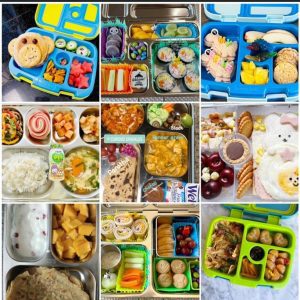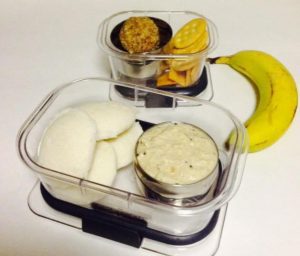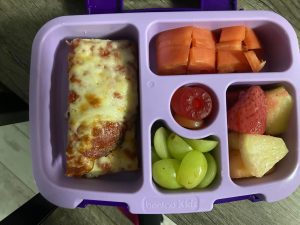Breakfast is crucial for children; and it should, by rotation, include at least four food groups to ensure all-round growth.

Skipping breakfast can lead to anxiety, mood issues in children, says study. (Representational Image/Creative Commons).
Children who skip, or don’t eat breakfast at home, are likely to develop problems related to self-esteem, mood and anxiety-related psycho-social issues, says a study.
“Many children who have early schools, have got into the habit of skipping breakfast at home and packing finger foods for their short breaks — this is something to worry about,” development paediatricians and nutritionists claim.
The study, published in Frontiers in Nutrition, states that it is not just important that children eat breakfast, but it is also important what they eat and where.
Researchers from the University of Castilla-La Mancha in Spain said: “Skipping breakfast or eating it away from home is likely to increase psycho-social behavioural problems in children and adolescents.”
The study further states that consumption of certain foods/drinks are associated with higher (for instance, processed meat) or lower (dairy, cereals) odds of psycho-social behavioural problems.
The researchers came to the conclusion after analysing data from the 2017 Spanish National Health Survey which had questionnaires on breakfast habits and also children’s psycho-social health.
The survey included questions on psycho-social health issues such as self-esteem issues, mood, and anxiety.
The researchers found that the children who ate breakfast away from home had higher issues of psycho-social health than those who ate at home. The researchers suggest that the reason could be due to the nutritional value of food prepared at home.

Different breakfast options (Facebook)
Speaking to South First Dr Chitra Shankar, consultant in developmental paediatrics at Manipal Hospital Old Airport Road in Bengaluru said, “Children need a healthy, balanced breakfast to support their physical activities as well as learning needs.”
“They need iron, calcium, protein, energy and fibre, and other vitamins and minerals as part of their balanced meals. This cannot come from a limited number of foods. Dietary diversity includes different types of food groups like cereals, proteins, healthy fats, milk and milk products, eggs, veggies, fruits and non-veg items,” Dr Shankar added.
The doctor said that poor nutritional can result in iron and other micro-nutrient deficiency, resulting in poor attention spans, memory loss, and lack of physical and mental energy — all of which could compromise learning.
“Meals not cooked at home are not balanced food and therefore not desirable as they do not provide optimal nutrition,” Dr Shankar said.
Researchers claim that though the study is limited to Spain, the findings are consistent with findings in other parts of the world.
Speaking to South First, Dr Sreenivas S, paediatrician and state president of the Indian Medical Association-Karnataka, said: “As in adults even in children, the first meal to break the fast is breakfast. After a long gap of almost 12 hours, the body needs a good, nutritious meal.”
“If children do not eat enough in the morning, for whatever reasons, they will turn cranky in class, cannot pay attention, have issues in socialising, and also have severe anaemia issues which will also lead to several developmental delays,” Dr Sreenivas said.
The IMA state president added that one of the three stages of development includes behavioural development and, during this stage, if children do not receive nutritious food, their growth might slow down.

While packing their food box, parents should ensure it has food with nutrient value like upma, poha and chapatis. (Supplied)
Bengaluru-based clinical nutritionist Dr Remya Rajan said that she has seen many cases where parents do not have time to prepare breakfast or children themselves avoid eating breakfast.
“The food that is sent for short breaks should be sumptuous and healthy, and not something which is easy to send,” Dr Rajan added.
“Many children leave home for school around 6.30 am. At this time it is not possible for all to have a full, healthy breakfast. Parents should ensure that, while packing their food box, they give food with nutrient value like upma, poha and chapatis instead of bread-jam or bread-butter.”
Dr Mahesh Gowda, a psychiatrist associated with Spandana Hospitals said: “While examining a child we check on nutrition and vitamins in the body to gauge a person’s mental health. A child’s eating and sleeping habits affect their social behaviour.”
“Breakfast not only helps to kickstart your child’s metabolism, it also improves their mental health and upscales their academic performance,” noted Edwina Raj, senior clinical dietician with Aster CMI Hospital-Bengaluru.
Dr Rajan recommends parents give oats, egg-with-veggies wraps or some egg/chickpea-based stuffing, and multigrain dosa wrap filled with protein-based stuff for breakfast.
Meanwhile, there are children who leave as early as 6 am and can’t eat and carry their breakfast to school. For such children, chia pudding with dry fruits, paneer paratha, beetroot, and green peas tikki are options.
Dr Shankar said foods given have to be rotated and a minimum of four food groups have to be included in the diet every day as kids get bored eating the same food every day.

A breakfast combination of fruits, veggies and protein. (Supplied)
The Spanish researchers also state that children who have breakfast with their families have good psycho-social behaviour.
Several doctors said that due to the schedule of children and parents this is almost impossible during weekdays.
According to the authors of the study, children receive support and a sense of security while having breakfast with the family.
“Having meals together helps in proper all-round growth in children. In India, in many households, having breakfast together is not possible, but parents ensure they sit together for dinner when everyone is at home,” Dr Rajan said.

May 06, 2024

May 06, 2024

May 06, 2024

May 04, 2024

May 04, 2024

May 03, 2024